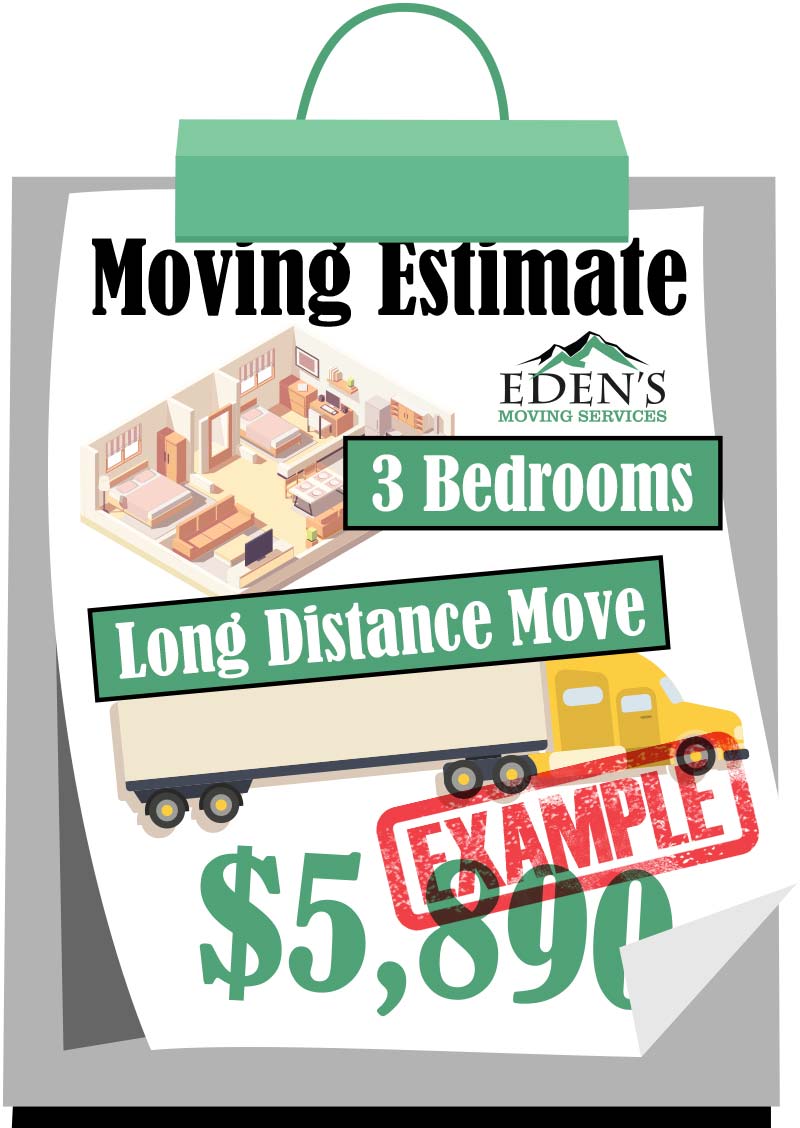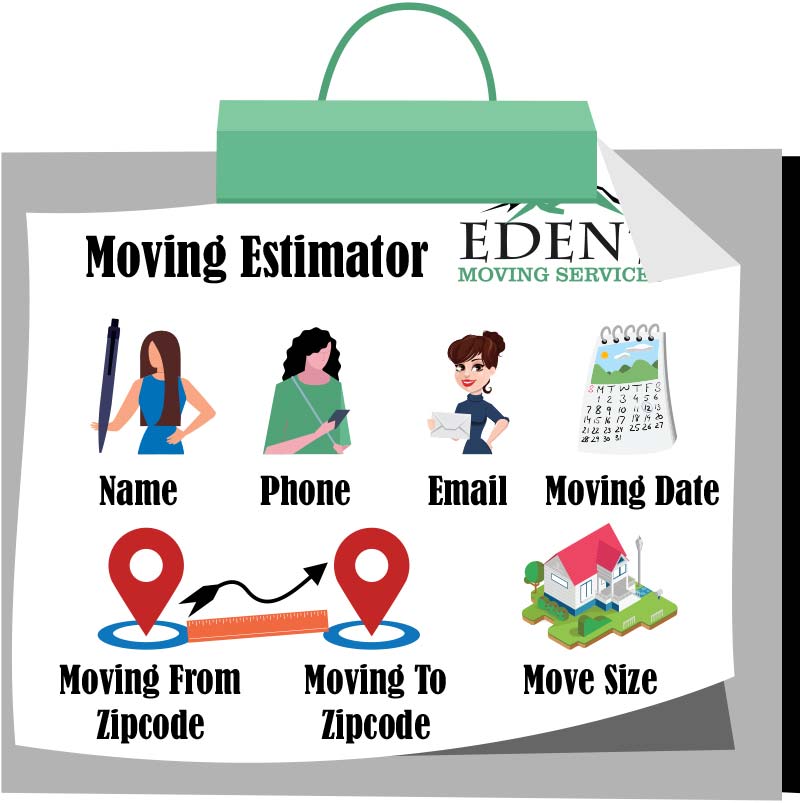Eden’s Moving Services commitment to quality
As one of the best Denver moving companies, we are here to help you prepare financially for any move. We are not only going to equip you with proven practical and effective cost-saving moving tips but will also provide you with our free moving cost calculator to help you correctly gauge the moving expenses of your next move. So, peruse the article and enhance your basic knowledge about the moving process.
What is the cost of a long distance move?
While moving can be an exciting experience, it can also be a costly adventure, especially if you are moving cross country. Are you planning on hiring professional long-distance movers for your upcoming relocation? If yes, you are in the right place.
So, what’s the average moving cost?
Generally, the overall cost of your move will depend on whether you are moving locally or long-distance. Whereas the average cost of a local move is approximately $1,390, long-distance moves that cover a thousand miles usually cost around $5,890. It is imperative to note that the above estimates are based on an average size three-bedroom home relocation of approximately 7,500 pounds or 1,250 cubic feet.


So, how do you calculate moving expenses?
To help estimate your moving cost, you may use our free moving price calculator. You will only need to submit the basic information at first, such as;

Once we receive this information, we will shortly contact you to schedule a free in-home or virtual walkthrough.
So, what factors impact your moving cost?
Many different factors affect the cost of most moves. Below are some of the most important factors that will largely determine the cost of your move.
- Size of your home: This is arguably the most significant factor that influences the cost of your move. After all, moving expenses largely depend on the number of things you’ll be shifting. Simply put, if you are moving lots of stuff, your move will not only take more time to complete, but the transportation of your items will also be bulkier, resulting in a significant increase in costs. In general, the more things you have to transport, the costlier your move will be!
- Moving to: Your moving distance is another factor that will influence the cost of your move. These expenses take into account things such as labor cost, fuel cost as well as mileage cost. So, if you are moving long-distance, you’ll have to incur more charges than when moving locally. Also, moving From Denver to Dallas is not the same price as moving from Denver to Miami.
- Packing services: When moving, you have the option to pack your stuff by yourself or hire packing professionals. While packing on your own will help reduce your moving expenses, improper packing will inevitably result in damages, especially if you have valuable and fragile items. On the other hand, hiring movers is highly convenient but will ultimately lead to extra costs!
- Storage: In some instances, storage in transit may be required if the home you are moving to is not ready, but you still have to vacate the old one. Some moving and storage companies will offer you a free month of storage, and some will not. And when this occurs, know you’ll have to part with extra dollars!
- Moving date: If you didn’t know your specific moving date can also significantly affect your moving cost. For instance, peak season or weekend moves usually cost relatively more than either week-days or off-season relocations.
- Moving supplies: Moving supplies can be quite expensive unless you have collected enough boxes before your move. The most popular moving supplies may include plastic bins, cardboard boxes, bubble wrap, packing papers, and other essential packing materials required for a long distance move.
- Moving add-ons: Also, your total moving expenses will be impacted by additional services you may choose to include, including the transportation of specialty items, shuttle services, multiple flights of stairs, elevator, or long haul.
- Valuation and liability coverage: If you are seeking the services of a moving company, the chances are high that you’ll need to buy some type of moving insurance. Many moving companies provide multiple protection levels, such as full value protection (FVP) and basic value release protection (limited liabilty coverage of 60 cents per pound per article). Kindly note that you may also need to buy extra moving insurance from a third party.
Moving FAQs:
What is the cost of moving?
If you are seeking the services of moving professionals, you’ll approximately need to pay at least $1,000. As we explained earlier, a local move will, on average, cost $2,250, whereas you’ll have to fork out at least $6,890 for a long-distance relocation. Remember, several factors will affect the overall cost of your move, ranging from the weight/ cubic feet of your items, distance, moving date, labor expenses, as well as any other extra services required to facilitate your move, such as packing or insurance coverage.
Are moving costs tax-deductible?
Moving costs are tax-deductible, so if you donate some of your household items to a charity organization before or after your move, make sure you itemize all of them, putting down their current market value on the donation receipt. You’ll undoubtedly claim a tax deduction on such donations. What’s more, if your move is work-related, you may be eligible for a tax deduction on relocation expenses.
What is the cost of valuation coverage?
It is worth noting that under the federal regulations, all cross-country movers must provide both Full Value Protection and Released Value protection to their clients. Full Value protection costs will always vary depending on your mover and on the valuation of your goods, so ask your moving company for more details. On the other hand, Released Value protection, which is the most basic liability level, is automatically featured in your moving cost. And it usually covers sixty cents per pound per item. However, if you need somewhat more comprehensive coverage, go for a Full Value Protection insurance policy. This implies that if your moving company loses or damages your items, it must either reimburse you based on the item’s current market value or replace the item.
Looking to hire Denver movers?
It would be best if you consider numerous factors when hiring a moving company. However, the most important factor to take into account is whether the cost is worth the effort. And if your answer is no, you’ll have to focus your attention on more affordable DIY alternatives, including moving containers or truck rentals. On the other hand, if you are not on a fixed budget and you would love to save energy and time on your move, working with moving professionals could be a great option. Of course, before settling on a particular moving method, you must consider the pros and cons of each option.
So, how are moving expenses calculated?
Generally, the overall cost of a long-distance or interstate move depends on the distance between your current location and destination, the weight of your shipment, and the associated labor expense. However, determining a local move cost is somehow slightly different. Local moves are based on a flat dollar amount per hour, and factors that impact this hourly rate include climbing multiple stairs, packing, labor costs, furniture assembly, and additional services. What’s more, a significant number of intrastate moves provide clients with a flat rate option. If you were not aware, a flat rate is usually your moving firm’s projected number of hours your move will take, multiplied by the hourly rate. On most occasions, this fixed cost includes add-ons costs.
Are moving expenses for a job tax deductible?
Possibly. If your move is work-motivated, your moving costs could be tax-deductible. The IRS states that if you are moving because of a change in your business or job new location or because you started a new business or job, you may be able to deduct your moving expense provided those expenses are not for meals. To be more precise, the IRS states that you can deduct these costs if:
Your move is closely related to the start of your job.
- You meet the time test as well as the distance test. To deduct these costs successfully, you’ll first need to fill out and submit IRS form 3903!
Seven proven tips to minimize your moving expenses?
Besides being one of the topmost stressful events you’ll ever experience in life, moving is also a highly expensive escapade. Luckily, we’ve got a few practical and effective tips to help you pack up and relocate on a budget!
- Do the packing yourself: While it may seem obvious, you would be surprised by the amount of money you can save by doing the packing on your own. Most moving companies usually provide packing services, but you’ll have to pay for this type of service. Packing rates may vary from one mover to another but will certainly cost not less than several hundreds of dollars. Thankfully, you can save on packing and moving costs by either packing yourself or inviting a few of your friends or family for assistance.
- Get quotes from at least three movers: Before you settle on a particular mover, you must first shop around for the best moving company. You should obtain quotes from at least three movers because moving costs can vary significantly from one firm to another. The company should perform physical or video inspections of your items before providing you with a written quote. Don’t accept any quote sent to you over the internet. For a trustworthy and accurate quote possible, your mover should be aware of any valuable items that may need extreme care. To hire a highly reputable, experienced, and reliable moving company, hire a local Denver mover that not only boasts top-quality trucks and equipment but directly employs insured and licensed moving professionals.
- Confirm whether your moving costs are tax-deductible or not: If you did donate a few of your belongings to charity organizations before you moved, make sure to keep those receipts because you’ll be able to submit these donations as a deduction from your annual taxes. Besides, if your move is work-related, you may be able to deduct your moving costs during the tax season.
- Don’t schedule your relocation on a peak moving season: As already mentioned, your moving date can have a significant impact on your overall relocation costs. Generally, it is advisable to go for a mid-week or mid-month move. This is because, during this period, the demand for moving services is relatively lower, so costs are also lower. Weekend moves usually attract more people because it is highly convenient. However, kindly note that there is only a fixed number of weekends in a year, and many clients will surely be vying for one of those dates. Additionally, most homeowners relocated in the summer. Studies show that nearly 70% of moves occur between Memorial Day and labor day! To be on the safest side, don’t move during this peak relocation period. Instead, move between late fall to winter to help minimize your moving expenses.
- Find free moving supplies as well as boxes: If you didn’t know, moving firms usually charge hefty fees for packing supplies. Save money by using boxes, plastic bins as well as containers you already have at your disposal. Also, you can purchase packing essentials from a recycled box company, large chain stores, liquor stores, grocery stores, and office establishments. What’s more, you can find free moving supplies on Freecycle, Craigslist, U-Haul, local social media groups as well as Nextdoor.com. As a leading moving service provider in Denver, we have partnered with UsedCardboards.com and UBoxes.com to help our customers buy moving boxes and other vital supplies at the most affordable prices.
- Dispose of your unwanted items: Purging some of your less essential or unused items is arguably the quickest way to reduce your moving costs. By eliminating your outdated electronics, unnecessary furniture, unworn clothes as well as unwanted items, your shipment will likely weigh less, making your move relatively less expensive when hiring licensed movers.
- Seek the help of family members and close friends: if you are in a position to pay for the services of a professional moving company, you can invite your friends and family to help you out. Of course, you must give them a notice earlier enough when seeking their help with moving. At the same time, make sure these helpers are healthy and strong enough to lift your bulky items such as appliances and furniture!


